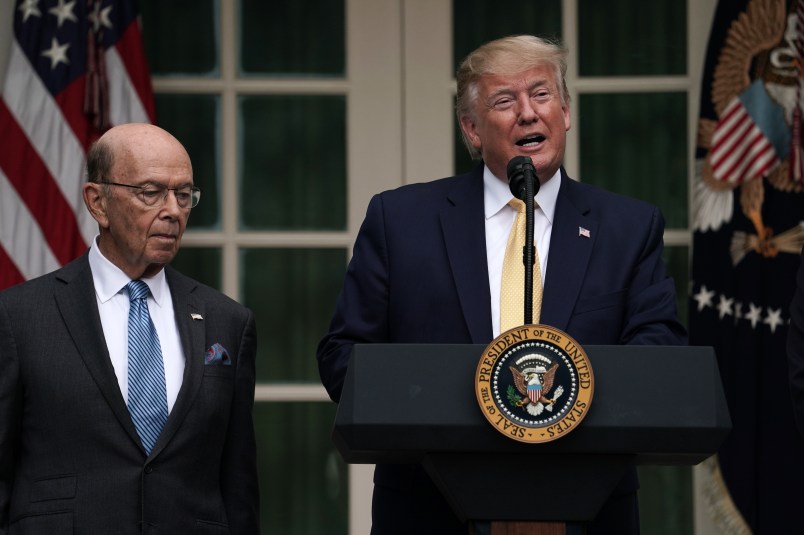The three-judge court that blocked the Trump administration’s efforts to exclude undocumented immigrants from congressional apportionment said Tuesday that it would not put that ruling on hold while the government appeals it.
The court, which is made up of two GOP appointees and one Democratic appointee, said that the Justice Department had put forward “meritless” and “frivolous” arguments in asking for the pause in the ruling.
Its refusal to grant the DOJ request means that the administration will now be relying on the Supreme Court to reinstate that policy while the justices review the case, which was brought in New York. If the court does not intervene to put on hold the panel’s ruling, the ruling will likely remain in effect while a Supreme Court decision on the legality of the policy is pending. That decision might not come until after the inauguration, presenting the risk for President Trump that he will no longer be in office to implement that policy.
The Justice Department has been incredibly aggressive in its approach to litigating the census disputes that have arisen during the Trump administration — a sign of the high stakes of the decennial survey, particularly in how it allocates political power across the country for the decade to come.
The dispute that is now heading to the high court is over whether undocumented immigrants can be removed from the census population totals that are used to determine how many congressional seats each states get. Doing so would starve immigrant rich states of congressional representation, while boosting the electoral advantage of whiter, more rural parts of the country.
Several lawsuits have been filed across the country challenging Trump’s July move to direct the Commerce Department, which oversees the census, to take on such an initiative.
The three-judge panel in the New York case previously said that the new apportionment policy violates laws dictating that a state’s entire population be used for the apportionment process. The court did not weigh in on the constitutionality of the policy, though it is broadly believed to be a violation of the Constitution’s mandate that a “whole number of persons” be used for congressional apportionment.
In its previous order blocking implementation of Trump’s policy, the panel said that its decision on the merits of Trump’s policy was a simple one. The panel instead devoted much of its opinion explaining why it believed now was the appropriate time for the court to order that the new policy be blocked.
The Justice Department had been arguing that resolving the legality of the policy should wait until the Census Bureau actually presents the set of apportionment numbers Trump requested, since it is possible that Trump’s request might not be feasible to implement.
That argument was discussed at length at hearing in D.C. Tuesday morning, where a three-judge panel based there was hearing one of the other lawsuits filed challenging the policy.
That panel is made up of two Trump appointees and one Obama-nominated judge. In that hearing, Judge Gregory Katsas, who worked in Trump’s White House counsel’s office before his appointment to the bench, seemed to suggest that he would prefer to wait to decide the legality of the policy. He leaned into the idea that it’s now yet known whether the administration would ultimately try to exclude all undocumented immigrants or just some subset.
“If we have to decide this all or nothing choice between the president, being able to wipe all illegal aliens off the apportionment base and the President being unable to say anything about people right on the cusp of being removed, man, that’s a pretty big deal,” he said.
The other Trump-appointed judge on the panel, Dabney Friedrich, asked relatively few questions, but showed interest in the timing implications, as did Obama appointee Judge Chris Cooper, who, on the flip side, asked about how delaying a decision could pose logistical challenges for those who use the census.
We could soon see whether the Supreme Court’s conservative majority thinks it’s appropriate to invalidate the policy now. The administration is almost guaranteed to now ask that the Supreme Court put on hold the decision in the New York case blocking it.







It seems like what the Trump maladministration wants is not to count anyone who can not vote. So is Trump planning on eliminating children? What about felons in states that have lost their franchise?
Court to DOJ: “You can stop being assholes anytime now.”
I think you meant the Trump administration only wants to count white male property owners who vote for Republicans.
I worked the last census. We counted the population in jails/prisons and hospitals and wherever people could be counted… food banks, convents, rehab facilities, homes for battered women and unwed mothers and we counted all “persons” (as required by the constitution) regardless of age, color or sex. Apparently, that is not what the bloated yam in the white house wants this time around.
And why is it that everything trump wants to do has to be fast-tracked to the Supreme court?
Can we just get rid of all of the other courts (district, circuit and appeals) and get quick decisions like the ass hat president?